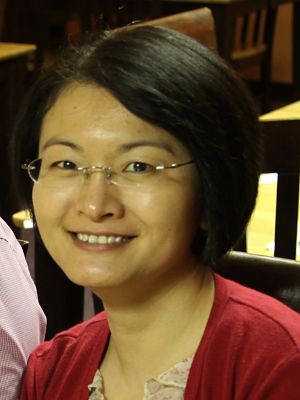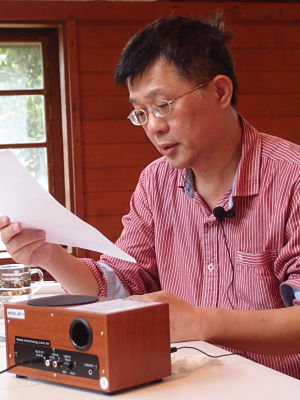A Lesson in Translation
A sin of beauty is a toy forever:
I transgress; I jumble up words,
fumble for the right age, mislabel
Keats for Yeats, bumble between
the present tense and the past tense.
For elegance, for beauty,
for my inflexible desire, I dismiss
faithfulness and disable meaning.
I mistranslate flyable twilight as
an unshakable rock in the shade.
My trembling heart turns gullible; I
bungle because I dread crumbling
my invaluable self to fulfill
something noble. I scramble parts of
speech and stumble over the nature
of a lost pitch or peach. I nibble at
the peach, nuzzle its scent, gobble its
color, but have trouble pitching
its flavor. I juggle my translation:
A sin of beauty is
a toy for adults forever——
Beauty forever is a toy for—
a sin of—adults.
![]()
翻譯課
美的罪過是永恆的
玩具:我有罪,我
背錯單字,我記錯
年齡,分不清濟慈
葉慈,現在式過去式
我為了雅,為了美
為了達我所欲達
而背信,毀義
我把稍縱即逝的飛霞
誤譯為樹蔭下的磐石
我粗心因為驚心,我
大意因為不敢大義滅親
除三害,除至親的自己
我弄錯詞性,把握不住
迷逃或蜜桃的本質
我咬了一口又一口桃
聞到它的香,吃了它的
色,始終沒有把味道
翻出來。我重修翻譯:
美的罪過是永恆的
成人玩具——
A sin of beauty is
a toy for adults forever.
![]()
Note: The first line references “A thing of beauty is a joy forever” in John Keats’s “Endymion.”
Translator’s Note:
Chen Li is one of the most prominent and prolific contemporary poets writing in Chinese. He and I first met when I interviewed him for my field research of Taiwan visual poetry in 2014. Having a strong penchant for word play, sound play, and visual creativeness, Chen Li is a key player of Chinese-language concrete poetry. His best-known work in the West is arguably the concrete piece, “A War Symphony,” which can be found in Poetry (March 2010), along with a commentary by the poet.
Intrigued by the “magic in language and form that characterizes Chen Li’s poetry,” to borrow the words of The Cambridge History of Chinese Literature, I began to translate some of his poems. An avid translator himself, Chen Li reads my translations with enthusiasm, patience, and understanding. His feedbacks and suggestions are often sources of inspiration that could extend both ways, as in “A Lesson in Translation.” According to him, the poem was stimulated by our discussions of my translations.
Opening with a reference to “A thing of beauty is a joy forever,” from John Keats’s “Endymion,” Chen Li’s poem depicts the translator’s “crime” of transgression due to his (or her) own aesthetic principles, leading to a series of bafflements. To highlight the idea of translator as traitor, I attempted a meta-translation (i.e., a self-reflexive approach to translation). As translator/traitor, “I transgress” by cramming the translation with assonance to an almost farcical effect. While the assonance echoes the homophony in the Chinese characters 大意 (dàyì, “carelessness”) versus 大義 (dàyì, “righteousness”), and 迷逃 (mítáo, “to lose one’s way”) versus 蜜桃 (mìtáo, “peach”), the formal hyperbole created by the assonance contrasts with the notion of eternal beauty that frames the original poem. I problematize the notion with another transgression; namely, a “juggle” or an intra-lingual transposition of the English translation that Chen Li has done for the last two lines of the Chinese poem.
Through the meta-translation, I hope to draw the reader’s attention to how translation can say something more, something other than the original. I also hope to foreground the role of translation in trans-lingual exchange, less as a proxy than as a site of dynamic linguistic encounter experienced by not only the translator but also the reader.
 Elaine Wong received a PhD in English at the University of Texas at San Antonio. She found her way to literary translation through her doctoral dissertation on the poetic creativity of written signs. Besides translating, she is a part-time linguistics lecturer at Trinity University, San Antonio. Her poems, translations, and scholarly essays have appeared or are forthcoming in Asymptote, Exchanges, Grey Sparrow, International Poetry Review, InTranslation, L2, Metamorphoses, Modern Poetry in Translation, Reunion, TAB, Transference, Two-Thirds North, and other publications.
Elaine Wong received a PhD in English at the University of Texas at San Antonio. She found her way to literary translation through her doctoral dissertation on the poetic creativity of written signs. Besides translating, she is a part-time linguistics lecturer at Trinity University, San Antonio. Her poems, translations, and scholarly essays have appeared or are forthcoming in Asymptote, Exchanges, Grey Sparrow, International Poetry Review, InTranslation, L2, Metamorphoses, Modern Poetry in Translation, Reunion, TAB, Transference, Two-Thirds North, and other publications.
 Chen Li lives in Hualien, Taiwan. He has published fourteen poetry books and has been a recipient of Taiwan’s National Award for Literature and the Arts, the Taiwan Literature Award, and other literary prizes. While his poems have been translated into English, French, Spanish, Dutch, German, Croatian, Japanese, and Korean, Chen Li has translated, in collaboration with his wife Chang Fen-ling, more than twenty poetry volumes into Chinese, including the works of Robert Hass, Seamus Heaney, Brenda Hillman, Pablo Neruda, Octavio Paz, Sylvia Plath, and Wisława Szymborska. Chen Li participated in the University of Iowa’s International Writing Program in 2014.
Chen Li lives in Hualien, Taiwan. He has published fourteen poetry books and has been a recipient of Taiwan’s National Award for Literature and the Arts, the Taiwan Literature Award, and other literary prizes. While his poems have been translated into English, French, Spanish, Dutch, German, Croatian, Japanese, and Korean, Chen Li has translated, in collaboration with his wife Chang Fen-ling, more than twenty poetry volumes into Chinese, including the works of Robert Hass, Seamus Heaney, Brenda Hillman, Pablo Neruda, Octavio Paz, Sylvia Plath, and Wisława Szymborska. Chen Li participated in the University of Iowa’s International Writing Program in 2014.




